LAW00720 Legal Studies: Analyzing Contract Law in Grocery Dispute
VerifiedAdded on 2023/06/08
|7
|2795
|143
Case Study
AI Summary
This assignment presents a legal case study involving AFS Grocery Wholesalers Pty Ltd and John's Supermarket, focusing on contract law and agency principles. The first part addresses whether AFS Grocery can recover payment from John's Supermarket for goods ordered by Linda, the manager, and the impact of John's potential restriction on Linda's ordering authority. It discusses offer, acceptance, consideration, and intention to create legal relations, along with available contractual remedies like damages and specific performance. The second part examines whether Bruno can avoid liability under a contract with Moreslybo Pty Ltd, considering unconscionable conduct and the impact of Bruno's intoxication. The analysis refers to relevant case laws and sections of the Australian Consumer Law to determine the validity of the contracts under scrutiny.

law
1
Law
1
Law
Paraphrase This Document
Need a fresh take? Get an instant paraphrase of this document with our AI Paraphraser
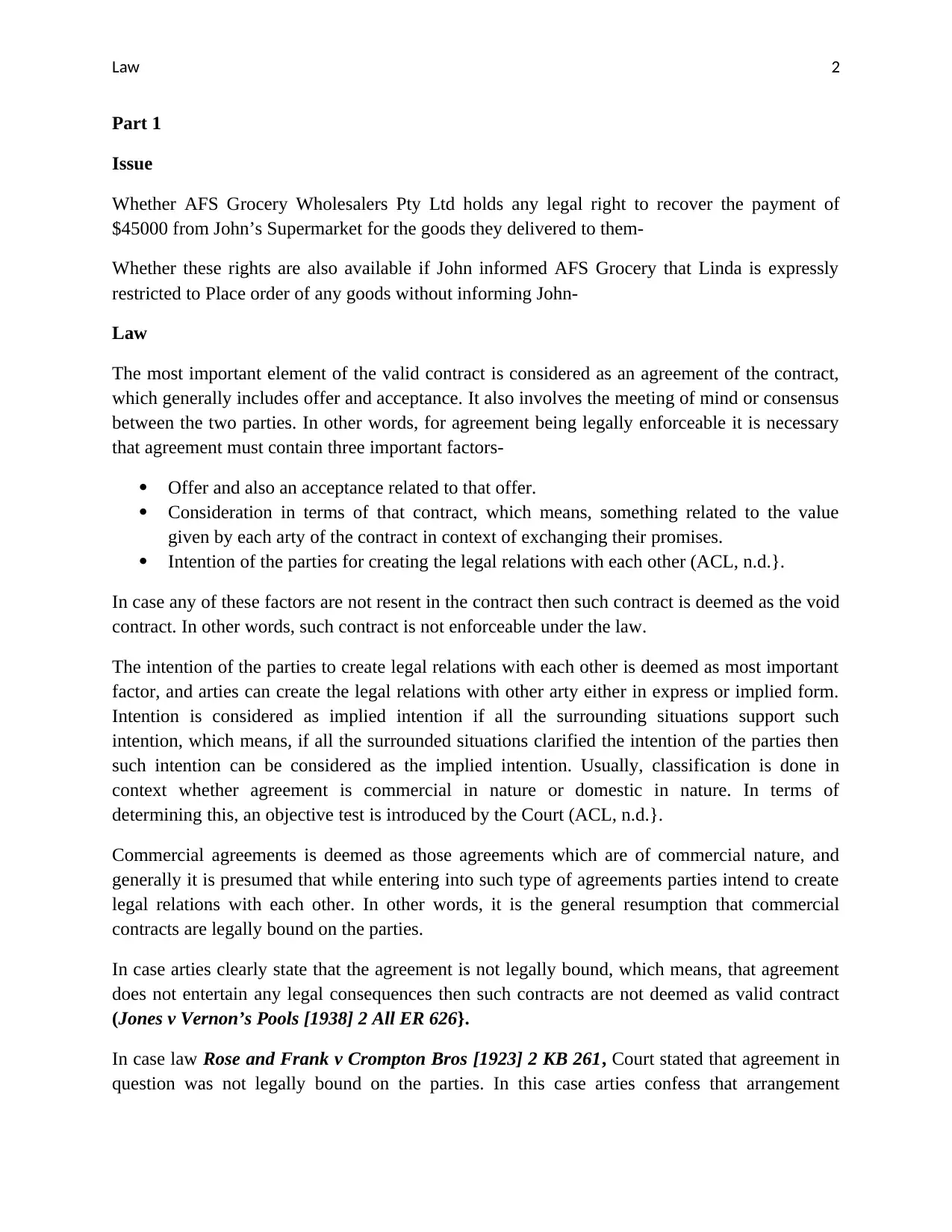
Law 2
Part 1
Issue
Whether AFS Grocery Wholesalers Pty Ltd holds any legal right to recover the payment of
$45000 from John’s Supermarket for the goods they delivered to them-
Whether these rights are also available if John informed AFS Grocery that Linda is expressly
restricted to Place order of any goods without informing John-
Law
The most important element of the valid contract is considered as an agreement of the contract,
which generally includes offer and acceptance. It also involves the meeting of mind or consensus
between the two parties. In other words, for agreement being legally enforceable it is necessary
that agreement must contain three important factors-
Offer and also an acceptance related to that offer.
Consideration in terms of that contract, which means, something related to the value
given by each arty of the contract in context of exchanging their promises.
Intention of the parties for creating the legal relations with each other (ACL, n.d.}.
In case any of these factors are not resent in the contract then such contract is deemed as the void
contract. In other words, such contract is not enforceable under the law.
The intention of the parties to create legal relations with each other is deemed as most important
factor, and arties can create the legal relations with other arty either in express or implied form.
Intention is considered as implied intention if all the surrounding situations support such
intention, which means, if all the surrounded situations clarified the intention of the parties then
such intention can be considered as the implied intention. Usually, classification is done in
context whether agreement is commercial in nature or domestic in nature. In terms of
determining this, an objective test is introduced by the Court (ACL, n.d.}.
Commercial agreements is deemed as those agreements which are of commercial nature, and
generally it is presumed that while entering into such type of agreements parties intend to create
legal relations with each other. In other words, it is the general resumption that commercial
contracts are legally bound on the parties.
In case arties clearly state that the agreement is not legally bound, which means, that agreement
does not entertain any legal consequences then such contracts are not deemed as valid contract
(Jones v Vernon’s Pools [1938] 2 All ER 626}.
In case law Rose and Frank v Crompton Bros [1923] 2 KB 261, Court stated that agreement in
question was not legally bound on the parties. In this case arties confess that arrangement
Part 1
Issue
Whether AFS Grocery Wholesalers Pty Ltd holds any legal right to recover the payment of
$45000 from John’s Supermarket for the goods they delivered to them-
Whether these rights are also available if John informed AFS Grocery that Linda is expressly
restricted to Place order of any goods without informing John-
Law
The most important element of the valid contract is considered as an agreement of the contract,
which generally includes offer and acceptance. It also involves the meeting of mind or consensus
between the two parties. In other words, for agreement being legally enforceable it is necessary
that agreement must contain three important factors-
Offer and also an acceptance related to that offer.
Consideration in terms of that contract, which means, something related to the value
given by each arty of the contract in context of exchanging their promises.
Intention of the parties for creating the legal relations with each other (ACL, n.d.}.
In case any of these factors are not resent in the contract then such contract is deemed as the void
contract. In other words, such contract is not enforceable under the law.
The intention of the parties to create legal relations with each other is deemed as most important
factor, and arties can create the legal relations with other arty either in express or implied form.
Intention is considered as implied intention if all the surrounding situations support such
intention, which means, if all the surrounded situations clarified the intention of the parties then
such intention can be considered as the implied intention. Usually, classification is done in
context whether agreement is commercial in nature or domestic in nature. In terms of
determining this, an objective test is introduced by the Court (ACL, n.d.}.
Commercial agreements is deemed as those agreements which are of commercial nature, and
generally it is presumed that while entering into such type of agreements parties intend to create
legal relations with each other. In other words, it is the general resumption that commercial
contracts are legally bound on the parties.
In case arties clearly state that the agreement is not legally bound, which means, that agreement
does not entertain any legal consequences then such contracts are not deemed as valid contract
(Jones v Vernon’s Pools [1938] 2 All ER 626}.
In case law Rose and Frank v Crompton Bros [1923] 2 KB 261, Court stated that agreement in
question was not legally bound on the parties. In this case arties confess that arrangement
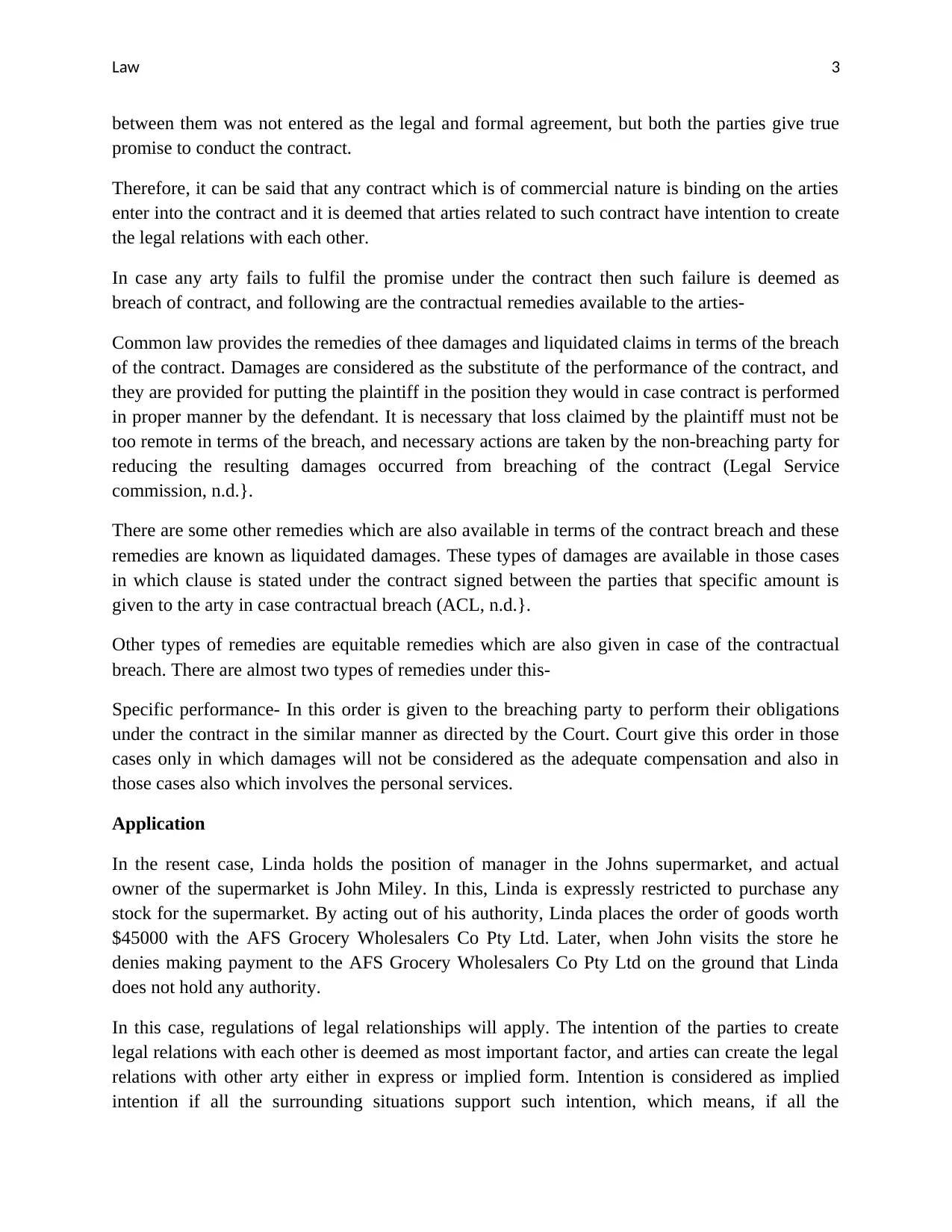
Law 3
between them was not entered as the legal and formal agreement, but both the parties give true
promise to conduct the contract.
Therefore, it can be said that any contract which is of commercial nature is binding on the arties
enter into the contract and it is deemed that arties related to such contract have intention to create
the legal relations with each other.
In case any arty fails to fulfil the promise under the contract then such failure is deemed as
breach of contract, and following are the contractual remedies available to the arties-
Common law provides the remedies of thee damages and liquidated claims in terms of the breach
of the contract. Damages are considered as the substitute of the performance of the contract, and
they are provided for putting the plaintiff in the position they would in case contract is performed
in proper manner by the defendant. It is necessary that loss claimed by the plaintiff must not be
too remote in terms of the breach, and necessary actions are taken by the non-breaching party for
reducing the resulting damages occurred from breaching of the contract (Legal Service
commission, n.d.}.
There are some other remedies which are also available in terms of the contract breach and these
remedies are known as liquidated damages. These types of damages are available in those cases
in which clause is stated under the contract signed between the parties that specific amount is
given to the arty in case contractual breach (ACL, n.d.}.
Other types of remedies are equitable remedies which are also given in case of the contractual
breach. There are almost two types of remedies under this-
Specific performance- In this order is given to the breaching party to perform their obligations
under the contract in the similar manner as directed by the Court. Court give this order in those
cases only in which damages will not be considered as the adequate compensation and also in
those cases also which involves the personal services.
Application
In the resent case, Linda holds the position of manager in the Johns supermarket, and actual
owner of the supermarket is John Miley. In this, Linda is expressly restricted to purchase any
stock for the supermarket. By acting out of his authority, Linda places the order of goods worth
$45000 with the AFS Grocery Wholesalers Co Pty Ltd. Later, when John visits the store he
denies making payment to the AFS Grocery Wholesalers Co Pty Ltd on the ground that Linda
does not hold any authority.
In this case, regulations of legal relationships will apply. The intention of the parties to create
legal relations with each other is deemed as most important factor, and arties can create the legal
relations with other arty either in express or implied form. Intention is considered as implied
intention if all the surrounding situations support such intention, which means, if all the
between them was not entered as the legal and formal agreement, but both the parties give true
promise to conduct the contract.
Therefore, it can be said that any contract which is of commercial nature is binding on the arties
enter into the contract and it is deemed that arties related to such contract have intention to create
the legal relations with each other.
In case any arty fails to fulfil the promise under the contract then such failure is deemed as
breach of contract, and following are the contractual remedies available to the arties-
Common law provides the remedies of thee damages and liquidated claims in terms of the breach
of the contract. Damages are considered as the substitute of the performance of the contract, and
they are provided for putting the plaintiff in the position they would in case contract is performed
in proper manner by the defendant. It is necessary that loss claimed by the plaintiff must not be
too remote in terms of the breach, and necessary actions are taken by the non-breaching party for
reducing the resulting damages occurred from breaching of the contract (Legal Service
commission, n.d.}.
There are some other remedies which are also available in terms of the contract breach and these
remedies are known as liquidated damages. These types of damages are available in those cases
in which clause is stated under the contract signed between the parties that specific amount is
given to the arty in case contractual breach (ACL, n.d.}.
Other types of remedies are equitable remedies which are also given in case of the contractual
breach. There are almost two types of remedies under this-
Specific performance- In this order is given to the breaching party to perform their obligations
under the contract in the similar manner as directed by the Court. Court give this order in those
cases only in which damages will not be considered as the adequate compensation and also in
those cases also which involves the personal services.
Application
In the resent case, Linda holds the position of manager in the Johns supermarket, and actual
owner of the supermarket is John Miley. In this, Linda is expressly restricted to purchase any
stock for the supermarket. By acting out of his authority, Linda places the order of goods worth
$45000 with the AFS Grocery Wholesalers Co Pty Ltd. Later, when John visits the store he
denies making payment to the AFS Grocery Wholesalers Co Pty Ltd on the ground that Linda
does not hold any authority.
In this case, regulations of legal relationships will apply. The intention of the parties to create
legal relations with each other is deemed as most important factor, and arties can create the legal
relations with other arty either in express or implied form. Intention is considered as implied
intention if all the surrounding situations support such intention, which means, if all the
⊘ This is a preview!⊘
Do you want full access?
Subscribe today to unlock all pages.

Trusted by 1+ million students worldwide
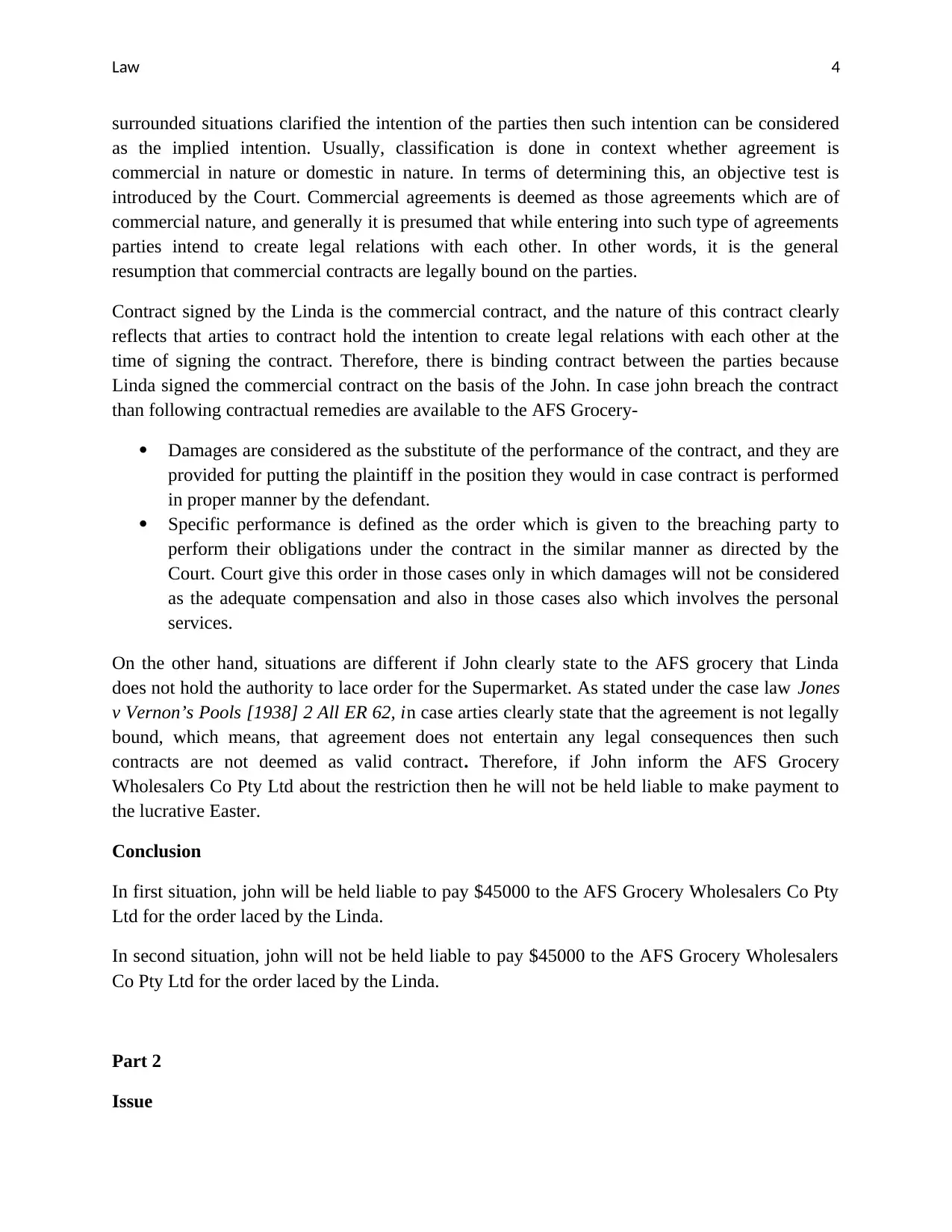
Law 4
surrounded situations clarified the intention of the parties then such intention can be considered
as the implied intention. Usually, classification is done in context whether agreement is
commercial in nature or domestic in nature. In terms of determining this, an objective test is
introduced by the Court. Commercial agreements is deemed as those agreements which are of
commercial nature, and generally it is presumed that while entering into such type of agreements
parties intend to create legal relations with each other. In other words, it is the general
resumption that commercial contracts are legally bound on the parties.
Contract signed by the Linda is the commercial contract, and the nature of this contract clearly
reflects that arties to contract hold the intention to create legal relations with each other at the
time of signing the contract. Therefore, there is binding contract between the parties because
Linda signed the commercial contract on the basis of the John. In case john breach the contract
than following contractual remedies are available to the AFS Grocery-
Damages are considered as the substitute of the performance of the contract, and they are
provided for putting the plaintiff in the position they would in case contract is performed
in proper manner by the defendant.
Specific performance is defined as the order which is given to the breaching party to
perform their obligations under the contract in the similar manner as directed by the
Court. Court give this order in those cases only in which damages will not be considered
as the adequate compensation and also in those cases also which involves the personal
services.
On the other hand, situations are different if John clearly state to the AFS grocery that Linda
does not hold the authority to lace order for the Supermarket. As stated under the case law Jones
v Vernon’s Pools [1938] 2 All ER 62, in case arties clearly state that the agreement is not legally
bound, which means, that agreement does not entertain any legal consequences then such
contracts are not deemed as valid contract. Therefore, if John inform the AFS Grocery
Wholesalers Co Pty Ltd about the restriction then he will not be held liable to make payment to
the lucrative Easter.
Conclusion
In first situation, john will be held liable to pay $45000 to the AFS Grocery Wholesalers Co Pty
Ltd for the order laced by the Linda.
In second situation, john will not be held liable to pay $45000 to the AFS Grocery Wholesalers
Co Pty Ltd for the order laced by the Linda.
Part 2
Issue
surrounded situations clarified the intention of the parties then such intention can be considered
as the implied intention. Usually, classification is done in context whether agreement is
commercial in nature or domestic in nature. In terms of determining this, an objective test is
introduced by the Court. Commercial agreements is deemed as those agreements which are of
commercial nature, and generally it is presumed that while entering into such type of agreements
parties intend to create legal relations with each other. In other words, it is the general
resumption that commercial contracts are legally bound on the parties.
Contract signed by the Linda is the commercial contract, and the nature of this contract clearly
reflects that arties to contract hold the intention to create legal relations with each other at the
time of signing the contract. Therefore, there is binding contract between the parties because
Linda signed the commercial contract on the basis of the John. In case john breach the contract
than following contractual remedies are available to the AFS Grocery-
Damages are considered as the substitute of the performance of the contract, and they are
provided for putting the plaintiff in the position they would in case contract is performed
in proper manner by the defendant.
Specific performance is defined as the order which is given to the breaching party to
perform their obligations under the contract in the similar manner as directed by the
Court. Court give this order in those cases only in which damages will not be considered
as the adequate compensation and also in those cases also which involves the personal
services.
On the other hand, situations are different if John clearly state to the AFS grocery that Linda
does not hold the authority to lace order for the Supermarket. As stated under the case law Jones
v Vernon’s Pools [1938] 2 All ER 62, in case arties clearly state that the agreement is not legally
bound, which means, that agreement does not entertain any legal consequences then such
contracts are not deemed as valid contract. Therefore, if John inform the AFS Grocery
Wholesalers Co Pty Ltd about the restriction then he will not be held liable to make payment to
the lucrative Easter.
Conclusion
In first situation, john will be held liable to pay $45000 to the AFS Grocery Wholesalers Co Pty
Ltd for the order laced by the Linda.
In second situation, john will not be held liable to pay $45000 to the AFS Grocery Wholesalers
Co Pty Ltd for the order laced by the Linda.
Part 2
Issue
Paraphrase This Document
Need a fresh take? Get an instant paraphrase of this document with our AI Paraphraser
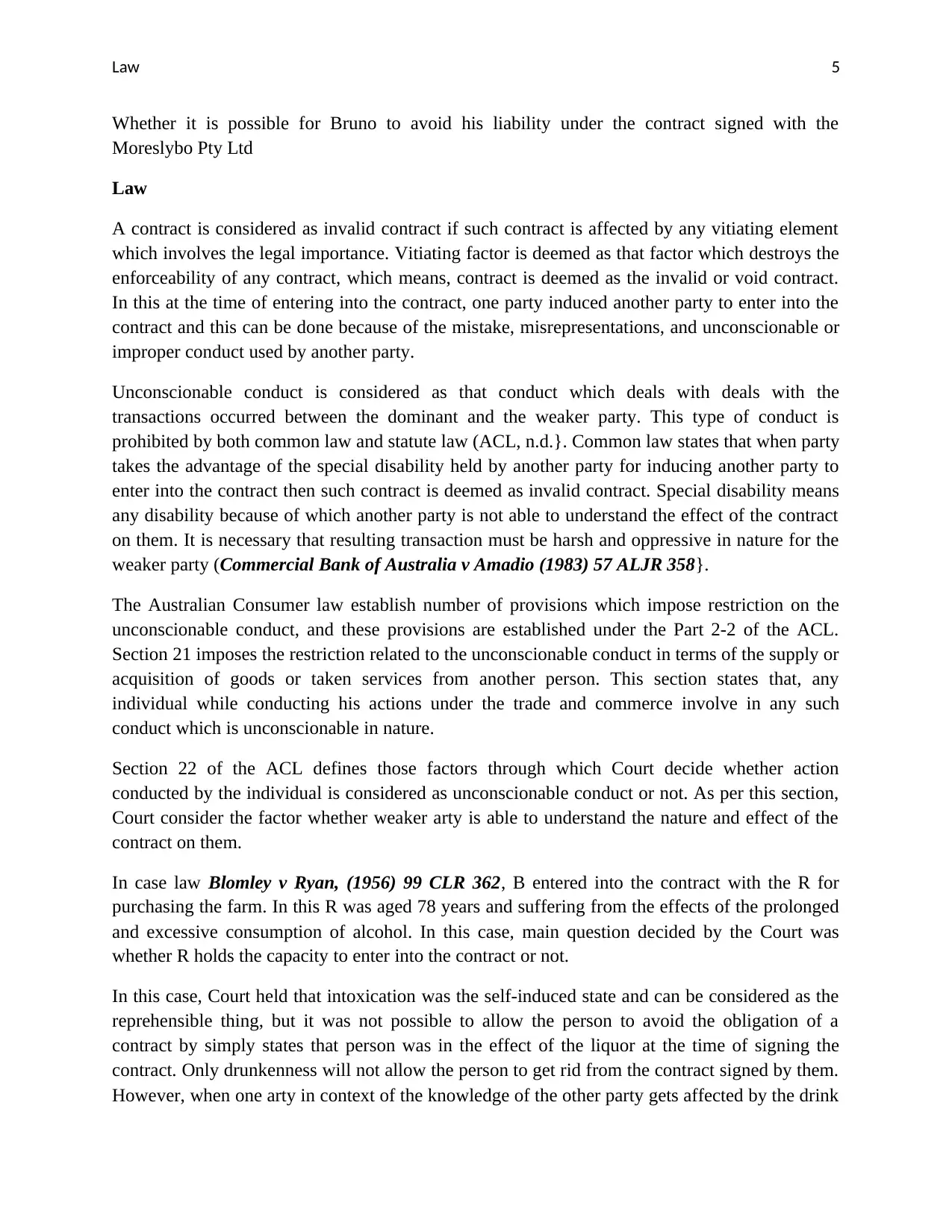
Law 5
Whether it is possible for Bruno to avoid his liability under the contract signed with the
Moreslybo Pty Ltd
Law
A contract is considered as invalid contract if such contract is affected by any vitiating element
which involves the legal importance. Vitiating factor is deemed as that factor which destroys the
enforceability of any contract, which means, contract is deemed as the invalid or void contract.
In this at the time of entering into the contract, one party induced another party to enter into the
contract and this can be done because of the mistake, misrepresentations, and unconscionable or
improper conduct used by another party.
Unconscionable conduct is considered as that conduct which deals with deals with the
transactions occurred between the dominant and the weaker party. This type of conduct is
prohibited by both common law and statute law (ACL, n.d.}. Common law states that when party
takes the advantage of the special disability held by another party for inducing another party to
enter into the contract then such contract is deemed as invalid contract. Special disability means
any disability because of which another party is not able to understand the effect of the contract
on them. It is necessary that resulting transaction must be harsh and oppressive in nature for the
weaker party (Commercial Bank of Australia v Amadio (1983) 57 ALJR 358}.
The Australian Consumer law establish number of provisions which impose restriction on the
unconscionable conduct, and these provisions are established under the Part 2-2 of the ACL.
Section 21 imposes the restriction related to the unconscionable conduct in terms of the supply or
acquisition of goods or taken services from another person. This section states that, any
individual while conducting his actions under the trade and commerce involve in any such
conduct which is unconscionable in nature.
Section 22 of the ACL defines those factors through which Court decide whether action
conducted by the individual is considered as unconscionable conduct or not. As per this section,
Court consider the factor whether weaker arty is able to understand the nature and effect of the
contract on them.
In case law Blomley v Ryan, (1956) 99 CLR 362, B entered into the contract with the R for
purchasing the farm. In this R was aged 78 years and suffering from the effects of the prolonged
and excessive consumption of alcohol. In this case, main question decided by the Court was
whether R holds the capacity to enter into the contract or not.
In this case, Court held that intoxication was the self-induced state and can be considered as the
reprehensible thing, but it was not possible to allow the person to avoid the obligation of a
contract by simply states that person was in the effect of the liquor at the time of signing the
contract. Only drunkenness will not allow the person to get rid from the contract signed by them.
However, when one arty in context of the knowledge of the other party gets affected by the drink
Whether it is possible for Bruno to avoid his liability under the contract signed with the
Moreslybo Pty Ltd
Law
A contract is considered as invalid contract if such contract is affected by any vitiating element
which involves the legal importance. Vitiating factor is deemed as that factor which destroys the
enforceability of any contract, which means, contract is deemed as the invalid or void contract.
In this at the time of entering into the contract, one party induced another party to enter into the
contract and this can be done because of the mistake, misrepresentations, and unconscionable or
improper conduct used by another party.
Unconscionable conduct is considered as that conduct which deals with deals with the
transactions occurred between the dominant and the weaker party. This type of conduct is
prohibited by both common law and statute law (ACL, n.d.}. Common law states that when party
takes the advantage of the special disability held by another party for inducing another party to
enter into the contract then such contract is deemed as invalid contract. Special disability means
any disability because of which another party is not able to understand the effect of the contract
on them. It is necessary that resulting transaction must be harsh and oppressive in nature for the
weaker party (Commercial Bank of Australia v Amadio (1983) 57 ALJR 358}.
The Australian Consumer law establish number of provisions which impose restriction on the
unconscionable conduct, and these provisions are established under the Part 2-2 of the ACL.
Section 21 imposes the restriction related to the unconscionable conduct in terms of the supply or
acquisition of goods or taken services from another person. This section states that, any
individual while conducting his actions under the trade and commerce involve in any such
conduct which is unconscionable in nature.
Section 22 of the ACL defines those factors through which Court decide whether action
conducted by the individual is considered as unconscionable conduct or not. As per this section,
Court consider the factor whether weaker arty is able to understand the nature and effect of the
contract on them.
In case law Blomley v Ryan, (1956) 99 CLR 362, B entered into the contract with the R for
purchasing the farm. In this R was aged 78 years and suffering from the effects of the prolonged
and excessive consumption of alcohol. In this case, main question decided by the Court was
whether R holds the capacity to enter into the contract or not.
In this case, Court held that intoxication was the self-induced state and can be considered as the
reprehensible thing, but it was not possible to allow the person to avoid the obligation of a
contract by simply states that person was in the effect of the liquor at the time of signing the
contract. Only drunkenness will not allow the person to get rid from the contract signed by them.
However, when one arty in context of the knowledge of the other party gets affected by the drink
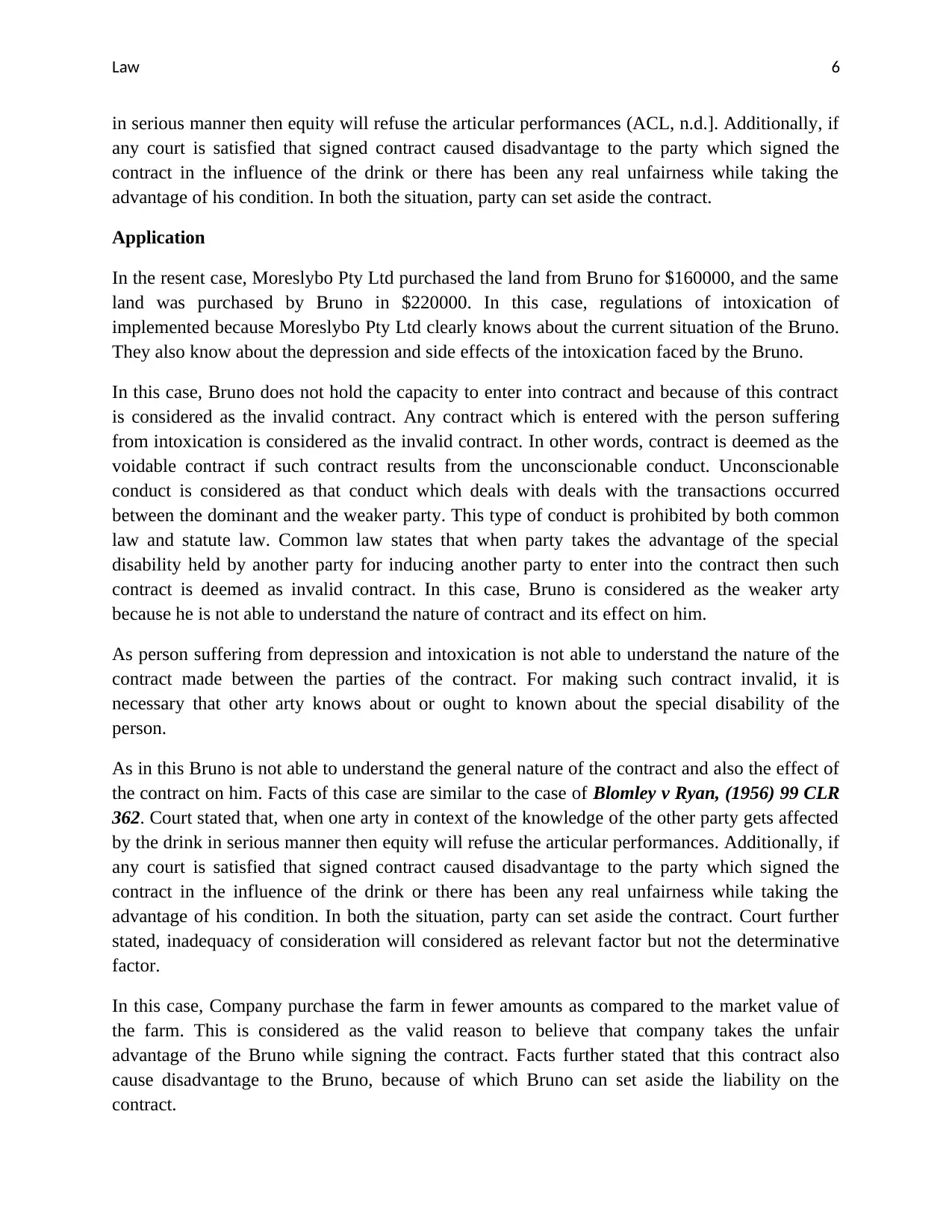
Law 6
in serious manner then equity will refuse the articular performances (ACL, n.d.]. Additionally, if
any court is satisfied that signed contract caused disadvantage to the party which signed the
contract in the influence of the drink or there has been any real unfairness while taking the
advantage of his condition. In both the situation, party can set aside the contract.
Application
In the resent case, Moreslybo Pty Ltd purchased the land from Bruno for $160000, and the same
land was purchased by Bruno in $220000. In this case, regulations of intoxication of
implemented because Moreslybo Pty Ltd clearly knows about the current situation of the Bruno.
They also know about the depression and side effects of the intoxication faced by the Bruno.
In this case, Bruno does not hold the capacity to enter into contract and because of this contract
is considered as the invalid contract. Any contract which is entered with the person suffering
from intoxication is considered as the invalid contract. In other words, contract is deemed as the
voidable contract if such contract results from the unconscionable conduct. Unconscionable
conduct is considered as that conduct which deals with deals with the transactions occurred
between the dominant and the weaker party. This type of conduct is prohibited by both common
law and statute law. Common law states that when party takes the advantage of the special
disability held by another party for inducing another party to enter into the contract then such
contract is deemed as invalid contract. In this case, Bruno is considered as the weaker arty
because he is not able to understand the nature of contract and its effect on him.
As person suffering from depression and intoxication is not able to understand the nature of the
contract made between the parties of the contract. For making such contract invalid, it is
necessary that other arty knows about or ought to known about the special disability of the
person.
As in this Bruno is not able to understand the general nature of the contract and also the effect of
the contract on him. Facts of this case are similar to the case of Blomley v Ryan, (1956) 99 CLR
362. Court stated that, when one arty in context of the knowledge of the other party gets affected
by the drink in serious manner then equity will refuse the articular performances. Additionally, if
any court is satisfied that signed contract caused disadvantage to the party which signed the
contract in the influence of the drink or there has been any real unfairness while taking the
advantage of his condition. In both the situation, party can set aside the contract. Court further
stated, inadequacy of consideration will considered as relevant factor but not the determinative
factor.
In this case, Company purchase the farm in fewer amounts as compared to the market value of
the farm. This is considered as the valid reason to believe that company takes the unfair
advantage of the Bruno while signing the contract. Facts further stated that this contract also
cause disadvantage to the Bruno, because of which Bruno can set aside the liability on the
contract.
in serious manner then equity will refuse the articular performances (ACL, n.d.]. Additionally, if
any court is satisfied that signed contract caused disadvantage to the party which signed the
contract in the influence of the drink or there has been any real unfairness while taking the
advantage of his condition. In both the situation, party can set aside the contract.
Application
In the resent case, Moreslybo Pty Ltd purchased the land from Bruno for $160000, and the same
land was purchased by Bruno in $220000. In this case, regulations of intoxication of
implemented because Moreslybo Pty Ltd clearly knows about the current situation of the Bruno.
They also know about the depression and side effects of the intoxication faced by the Bruno.
In this case, Bruno does not hold the capacity to enter into contract and because of this contract
is considered as the invalid contract. Any contract which is entered with the person suffering
from intoxication is considered as the invalid contract. In other words, contract is deemed as the
voidable contract if such contract results from the unconscionable conduct. Unconscionable
conduct is considered as that conduct which deals with deals with the transactions occurred
between the dominant and the weaker party. This type of conduct is prohibited by both common
law and statute law. Common law states that when party takes the advantage of the special
disability held by another party for inducing another party to enter into the contract then such
contract is deemed as invalid contract. In this case, Bruno is considered as the weaker arty
because he is not able to understand the nature of contract and its effect on him.
As person suffering from depression and intoxication is not able to understand the nature of the
contract made between the parties of the contract. For making such contract invalid, it is
necessary that other arty knows about or ought to known about the special disability of the
person.
As in this Bruno is not able to understand the general nature of the contract and also the effect of
the contract on him. Facts of this case are similar to the case of Blomley v Ryan, (1956) 99 CLR
362. Court stated that, when one arty in context of the knowledge of the other party gets affected
by the drink in serious manner then equity will refuse the articular performances. Additionally, if
any court is satisfied that signed contract caused disadvantage to the party which signed the
contract in the influence of the drink or there has been any real unfairness while taking the
advantage of his condition. In both the situation, party can set aside the contract. Court further
stated, inadequacy of consideration will considered as relevant factor but not the determinative
factor.
In this case, Company purchase the farm in fewer amounts as compared to the market value of
the farm. This is considered as the valid reason to believe that company takes the unfair
advantage of the Bruno while signing the contract. Facts further stated that this contract also
cause disadvantage to the Bruno, because of which Bruno can set aside the liability on the
contract.
⊘ This is a preview!⊘
Do you want full access?
Subscribe today to unlock all pages.

Trusted by 1+ million students worldwide
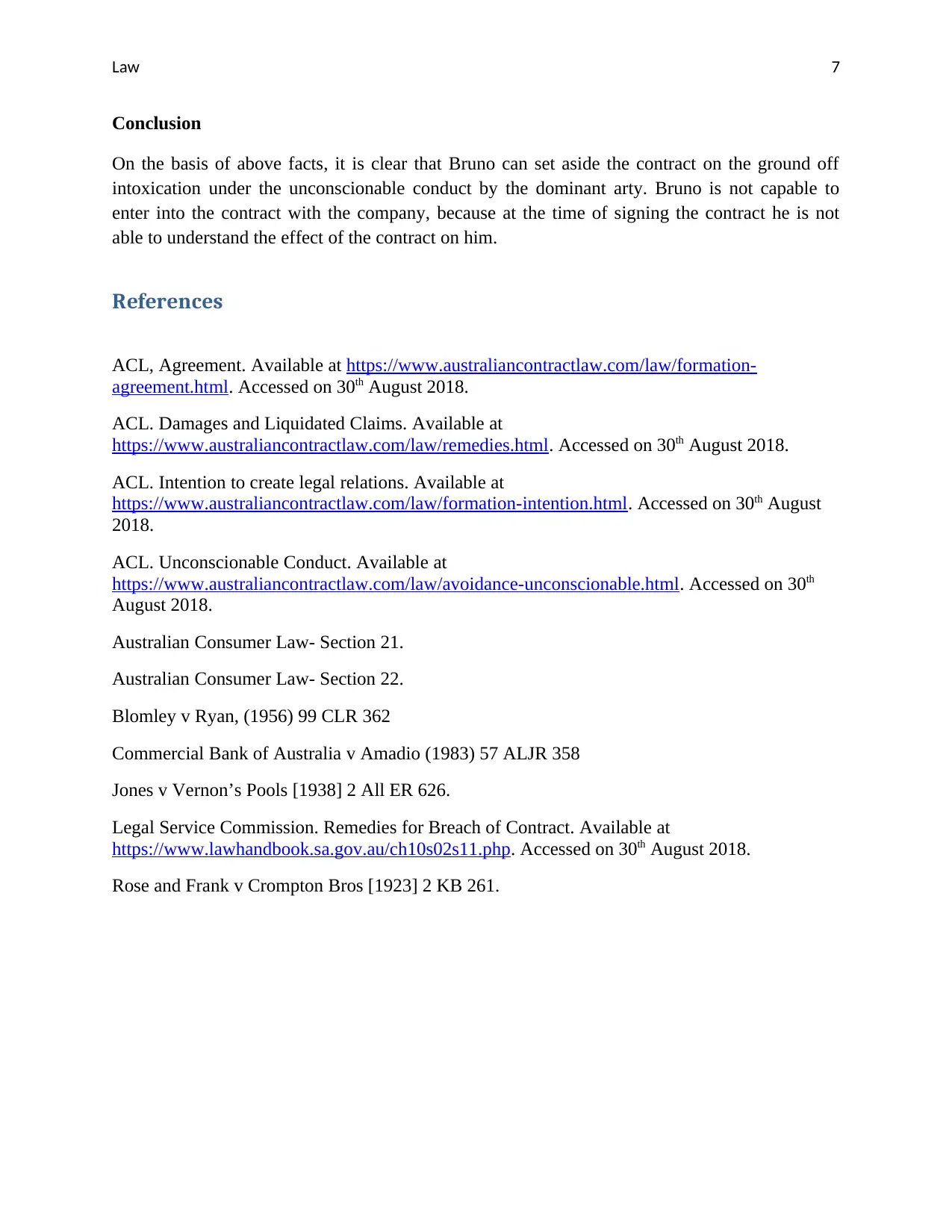
Law 7
Conclusion
On the basis of above facts, it is clear that Bruno can set aside the contract on the ground off
intoxication under the unconscionable conduct by the dominant arty. Bruno is not capable to
enter into the contract with the company, because at the time of signing the contract he is not
able to understand the effect of the contract on him.
References
ACL, Agreement. Available at https://www.australiancontractlaw.com/law/formation-
agreement.html. Accessed on 30th August 2018.
ACL. Damages and Liquidated Claims. Available at
https://www.australiancontractlaw.com/law/remedies.html. Accessed on 30th August 2018.
ACL. Intention to create legal relations. Available at
https://www.australiancontractlaw.com/law/formation-intention.html. Accessed on 30th August
2018.
ACL. Unconscionable Conduct. Available at
https://www.australiancontractlaw.com/law/avoidance-unconscionable.html. Accessed on 30th
August 2018.
Australian Consumer Law- Section 21.
Australian Consumer Law- Section 22.
Blomley v Ryan, (1956) 99 CLR 362
Commercial Bank of Australia v Amadio (1983) 57 ALJR 358
Jones v Vernon’s Pools [1938] 2 All ER 626.
Legal Service Commission. Remedies for Breach of Contract. Available at
https://www.lawhandbook.sa.gov.au/ch10s02s11.php. Accessed on 30th August 2018.
Rose and Frank v Crompton Bros [1923] 2 KB 261.
Conclusion
On the basis of above facts, it is clear that Bruno can set aside the contract on the ground off
intoxication under the unconscionable conduct by the dominant arty. Bruno is not capable to
enter into the contract with the company, because at the time of signing the contract he is not
able to understand the effect of the contract on him.
References
ACL, Agreement. Available at https://www.australiancontractlaw.com/law/formation-
agreement.html. Accessed on 30th August 2018.
ACL. Damages and Liquidated Claims. Available at
https://www.australiancontractlaw.com/law/remedies.html. Accessed on 30th August 2018.
ACL. Intention to create legal relations. Available at
https://www.australiancontractlaw.com/law/formation-intention.html. Accessed on 30th August
2018.
ACL. Unconscionable Conduct. Available at
https://www.australiancontractlaw.com/law/avoidance-unconscionable.html. Accessed on 30th
August 2018.
Australian Consumer Law- Section 21.
Australian Consumer Law- Section 22.
Blomley v Ryan, (1956) 99 CLR 362
Commercial Bank of Australia v Amadio (1983) 57 ALJR 358
Jones v Vernon’s Pools [1938] 2 All ER 626.
Legal Service Commission. Remedies for Breach of Contract. Available at
https://www.lawhandbook.sa.gov.au/ch10s02s11.php. Accessed on 30th August 2018.
Rose and Frank v Crompton Bros [1923] 2 KB 261.
1 out of 7
Related Documents
Your All-in-One AI-Powered Toolkit for Academic Success.
+13062052269
info@desklib.com
Available 24*7 on WhatsApp / Email
![[object Object]](/_next/static/media/star-bottom.7253800d.svg)
Unlock your academic potential
Copyright © 2020–2026 A2Z Services. All Rights Reserved. Developed and managed by ZUCOL.




